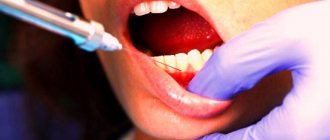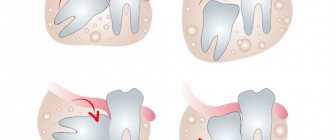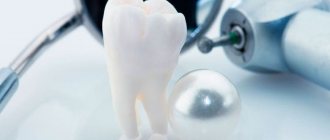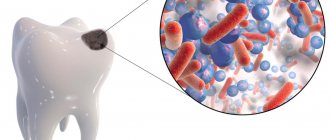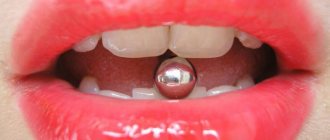Over the course of a month, serious hormonal changes occur in the female body.
General well-being and state of health largely depend on them. During menstrual bleeding, a woman often experiences severe discomfort, so some medical procedures and manipulations are contraindicated for her. Let's figure out whether it is possible to remove a tooth during menstruation? After all, this surgical operation is highly stressful and is not always easily tolerated by patients. At the Line of Smile dental clinic there is no clear policy not to operate on “these days.” But we always try to take into account the cyclical nature of women’s physiology, since surgery during menstruation can negatively affect further wound healing. Therefore, it is important for the client to be honest during the consultation with the doctor and not be embarrassed to ask to reschedule the planned operation. However, if an x-ray shows that there is an infectious focus, removal is carried out on an emergency basis, regardless of what day of the menstrual cycle we are talking about.
Why is it undesirable to have surgery during menstruation?
When planning an extraction, a highly qualified dentist always finds out what stage the woman is in her menstrual cycle. Why is he asking this? It's simple. The quality and composition of the blood directly determines the effectiveness of the anesthesia used and the rate of formation of a blood clot in the socket.
On menstrual days, blood clotting is significantly reduced. That's how it should be. Its composition also changes. Therefore, whenever possible, planned surgical intervention is postponed to “safer” days of the cycle.
Contraindications to the procedure
For some symptoms during the menstrual period, extraction is not done:
- severe abdominal pain, due to which you have to take painkillers;
- nausea;
- low blood pressure;
- heavy periods (heavy bleeding);
- dizziness.
If you feel unwell, surgical intervention will only worsen the problem. The likelihood of complications also increases, and pain after the anesthetic wears off can be excruciating.
Dental diagnoses in which periods are not a hindrance
If you doubt whether it is possible to remove a tooth during menstruation, contact your dentist. If the doctor deems it necessary, he will postpone the operation until later.
Indications for emergency intervention are:
- Severe inflammation, a purulent process that can provoke the development of an abscess, phlegmon, infection of the maxillary sinuses, osteomyelitis.
- A retracted (not fully erupted) wisdom tooth that is completely or partially hidden under the gum tissue/bone. It should be removed as soon as possible if a woman suffers from severe pain, swelling and swelling of the cheek.
- A tooth root fracture resulting from an injury.
- An advanced form of periodontal disease, when it is no longer possible to save the unit.
The specialists at the Line of Smile dental clinic never prescribe removal if it is possible to do without it. They always try to save the diseased tooth and prevent its further loosening and loss. If the roots are in good condition, a pin is installed in them, onto which the crown is fixed on top. Surgery is a last resort.
When you need to treat your teeth even on critical days
The TopSmile aesthetic dentistry clinic has many products for removing teeth in emergency situations, including during menstruation. Before the procedure, the doctor will give medications that will increase blood clotting and conduct computer anesthesia without syringes or injections.
Treatment should not be delayed if the patient:
- purulent inflammation: periodontitis, cyst;
- acute toothache;
- swelling or swelling of the cheek;
- tooth root fracture as a result of trauma;
- acute pulpitis;
- an impacted wisdom tooth that causes pain or swelling.
Note. Particularly dangerous symptoms are fever, bleeding and pus in the gum pockets and mouth. If pus gets inside, the infection will spread through the blood throughout the body, which can lead to the development of sepsis.
What procedures are allowed during menstruation?
There are dental procedures that can be performed without harming your health during menstruation. These include fillings, x-rays, teeth cleaning and whitening. At certain stages of treatment, even prosthetics are allowed.
Installation of a filling. A filling can be placed in a session on any day of the menstrual cycle. The procedure is painless, does not involve excision of tissue, and is sometimes performed without anesthesia. Menstruation does not affect the results. The filling will take root and will not change shape or color.
X-ray. X-rays act locally - on the area of the gum where the diseased tooth is located. The patient's pelvis is protected with a special coating. Due to the fact that the image is taken quickly, the flash of waves is so short-lived that it is not capable of causing harm to the patient. The doctor will perform all procedures in one place - at the dental chair. This means you don't have to move from one office to another to take a photo.
Prosthetics. The procedure can be performed if the orthodontist does not intend to place a pin for the implant. Hormonal imbalance and the production of prostaglandins can cause foreign body rejection. But in this situation, the doctor can prepare or adjust the prostheses for the patient.
This is a completely painless procedure that does not require anesthesia. The possibility of damage to oral tissues is virtually eliminated. The TopSmile clinic uses a gentle Swiss EMS ultrasound system. Thanks to it, it is possible to remove soft plaque, hard deposits and dark stains from the surface of the teeth without the risk of injury and enamel cracks. After polishing with brushes and pastes, the teeth will become smooth and shiny, and a protective layer will form on their surface that will repel new stains.
What are the risks and complications?
Most often, menstruation does not have any effect on the quality of dental procedures. However, the likelihood of certain complications and risks increases. This must be taken into account before deciding to carry out or postpone the operation.
It should be remembered that during menstruation, some women use painkillers. When combined with anesthesia, they can cause unwanted side effects.
Due to the high levels of the hormone prostaglandin in the blood, women feel pain more acutely, and due to blood loss, they experience nausea and weakness. Together, this can lead to fainting and high blood pressure.
Due to a weakened immune system, even the smallest cut can cause infection. As a result, after tooth extraction, the patient will have to treat gum suppuration.
TopSmile Clinic guarantees the safety of patients even on special days. We sterilize instruments in several stages, use premium consumables, half of which are disposable, monitor blood pressure during procedures and take into account all chronic diseases of the patient. We always keep in touch with the patient after surgery. The patient can always call the attending physician, and he will see him at any time of the day.
When to delay deletion
Any planned surgical intervention can be postponed for a couple of days until the menstrual bleeding stops.
So, you can wait if you need to delete:
- dystopic tooth located out of place;
- units that impede the implementation of prosthetics and the installation of orthodontic structures;
- wisdom teeth, which constantly injure the gums and mucous membranes of the oral cavity, cause chronic injuries and inflammation.
Chronic diseases often worsen on the eve of menstruation. This is due to a decrease in immune defense. If a woman knows that after menstruation she needs to go to the dentist and have a tooth removed, she should be especially careful about her health so as not to catch a cold. Otherwise, the procedure will have to be postponed indefinitely.
Why is it better not to treat teeth on critical days?
There are three reasons to postpone visiting the dentist until the end of your menstrual cycle.
1 reason. Blood clotting disorder. On critical days, a woman’s blood vessels dilate. If a tooth is removed during this period, it can lead to heavy bleeding, which only a doctor can stop.
Reason 2. Reduced pain threshold. Before menstruation, the female body produces prostaglandins. These are the hormones that start the process of menstruation. Thanks to them, the uterus contracts, its inner lining peels off and blood is released. Because of these hormones, a woman experiences pain and experiences any unpleasant sensations more intensely.
Reason 3. Risk of inflammation. During menstruation, blood clots more slowly than usual. Therefore, the holes in the oral cavity take several times longer to heal. The immune system is weakened and the body is vulnerable to infections. If a bacteria or virus enters an open wound, gum inflammation will begin.
Note. If on critical days a woman does not experience pain, discomfort and other unpleasant sensations, then dental procedures may not be tolerated. But you need to warn your dentist in any case.
Use of anesthetics
All surgical procedures are performed by Smile Line doctors using highly effective modern anesthetics. This guarantees the absence of pain during tooth extraction and makes the procedure as comfortable as possible.
Usually, when working with the first to fifth teeth, infiltration anesthesia is used. The dentist gives an injection, after which a separate area of the oral cavity “goes numb” and becomes insensitive. If it is necessary to pull out the sixth, seventh or eighth molar, the roots of which are very large and deep, they resort to conduction anesthesia.
Periods are so different
A woman’s body begins to prepare thoroughly and in advance for the menstrual cycle. After all, this is not just a condition in which blood flows from the genital organs; a whole series of both physiological and chemical transformations occur.
Many changes occur in the body during menstruation
For those women who cannot even get out of bed during their period, the question of the need to visit the dentist does not arise. The decision about whether such a tooth needs to be removed or treated depends on the characteristics of the body.
You should postpone going to the dentist in the following cases:
- menstruation is accompanied by pain and is discharged profusely;
- on critical days, the woman’s general well-being deteriorates greatly;
- there are diseases in the intimate area.
If menstruation occurs without pain and discomfort, the woman feels well and leads an active life, the situation with the possibility of treatment and tooth extraction looks a little different.
Most women become irritable and whiny
Precautions after treatment
If the procedure is performed on menstruation, the dental surgeon tells the patient about possible complications and gives detailed instructions on how to behave to avoid them. To minimize the risk of bleeding, you should stop smoking a few days before surgery. This will have a positive effect on blood clotting. Also the day before, you need to exclude coffee-containing drinks from your diet, reduce the intensity of sports training, and avoid hypothermia and overheating of the body.
Immediately after removal, you need to spend about an hour in the clinic so that the doctor can make sure that a dense clot has formed in the hole. It is not recommended to go to work on the day of the procedure. The best option is to go home and rest.
It is extremely important to follow all medical instructions and take prescribed medications. If your body temperature rises, the wound begins to bleed, your health deteriorates sharply, dizziness and nausea appear, you should immediately seek medical help.
There is no need to rinse unless prescribed by your dentist. You should also not touch the hole with your tongue. This can lead to the clot breaking off and opening the wound, causing re-bleeding. In addition, an uncovered hole is a gateway for infection.
Only a doctor can clearly answer the question of whether it is possible to remove a tooth during menstruation. In our dentistry, experienced surgeons perform tooth extraction. We do everything possible to ensure that our patients become healthy as quickly as possible.
In what cases is it better to postpone extraction?
Tooth extraction is a last resort when therapeutic treatment is impossible or does not bring a positive effect. If there is no serious inflammation, then the date of the planned operation can be postponed by several days.
Removal can be delayed for the following indications:
- extensive caries without an inflammatory process;
- dystopic teeth;
- extraction of dental units for further prosthetics.
If the operation has been postponed, then during menstruation you need to protect yourself from colds. Since immunity decreases during this period, you can easily get sick with acute respiratory infections. In case of acute respiratory diseases, removal is not performed, which means you will have to wait for an indefinite period of time.
When is it definitely worth going to the dentist?
Despite the numerous risks listed above, there are situations when it is not advisable to postpone a visit to the dental office. It is advisable to contact a dentist in cases when:
- there is severe, acute pain that cannot be tolerated;
- suppuration has occurred on the gum or under the outer shell of the tooth;
- soft tissues in the mouth are swollen;
- gums bleed heavily;
- there are symptoms indicating an abscess above the periosteum (flux);
- a cyst has formed.
In addition, a woman during menstruation does not need to refuse to visit the dentist if she cannot go to the doctor on a pre-planned day due to an urgent business trip, a long trip, or any other event. The patient must inform the dentist that she is undergoing adjustments so that the specialist can correctly diagnose and select medications. It is possible that in such a situation the doctor will not provide complete treatment, but will only eliminate painful symptoms and prescribe therapy that allows you to postpone more serious procedures for some time.
For example, if there is debilitating pain, an inflammatory or purulent process is occurring, the dentist will professionally clean it, apply a special medicine to the disturbing tooth, and install a temporary filling. And more complex measures, such as removing nerves, cleaning canals, or tooth extraction, should be carried out later, when menstruation ends.
Any woman can experience menstrual irregularities
Failures can be associated not only with diseases of the pelvic organs, but also with disorders in the endocrine, nervous, and immune systems. It should also be remembered that sometimes they signal the development of certain infectious diseases or pathological conditions:
- ectopic pregnancy;
- neoplasms in internal organs;
- malignant or benign neoplasm in the uterus or on its surface;
- STD;
- tuberculosis.
Some girls believe that tampons also provoke changes in the cyclicity of menstruation, but this opinion is incorrect. They are the same means of hygiene during menstruation as pads and menstrual cups.
Prosthetics
A dental operation such as prosthetics is a rather complex, multi-stage process. Most of the manipulations can be carried out without any fear during critical days. In particular, we are talking about:
- preparatory procedures;
- taking jaw impressions;
- trying on plaster mass;
- correction processes;
- installation of prostheses.
But it is better to postpone the final stage of screwing the pin directly into the jawbone until the end of your period. Poor blood clotting, which is inherent in many women in this phase, can lead to a number of unsafe consequences and complications. For the same reasons, it is necessary to exclude, if possible, the removal of old dentures during menstruation.
Irregular periods during adolescence
In teenage girls, menstrual irregularities are quite common. This is due to physiological reasons. That is, the hormonal background has not yet been established and the duration of both the cycle itself and menstruation may be different each time. The norm is considered to be the formation of a cycle over 1 – 2 years.
Pathological factors and causes of irregular periods include:
- traumatic brain injuries;
- infectious lesions of the brain and its membranes;
- tendency to colds;
- vegetative-vascular dystonia;
- obesity;
- sclerocystic ovaries and genital infections.
Of no less importance is the craze among girls for dieting, which leads not only to significant loss of body weight, but also to hypovitaminosis and menstrual irregularities. In addition, the regularity of the menstrual cycle is also affected by the girl’s character (too emotional, impulsive or aggressive).
The following also play a role in cycle disruption:
- early and promiscuous sexual intercourse;
- bad habits;
- malformations of the reproductive system.
An disrupted menstrual cycle in girls can result in a complication such as juvenile uterine bleeding. In this case, periods last more than a week and are heavy, which leads to anemia in the child (see iron supplements for anemia). Typically, juvenile bleeding is provoked either by an infectious process or by nervous strain.
Causes of menstrual irregularities
The main reason for the disruption of the menstrual cycle is hormonal imbalance. This happens in various diseases and conditions. The hereditary factor also plays an important role - if ancestors on the female line had disruptions in the cycle or other disorders, it is quite possible that this will affect the nature of menstruation in women in subsequent generations.
Lack of sleep, stress, excessive physical activity, psychological fatigue, change in time zone or climatic conditions can lead to irregular periods. It is not uncommon to experience menstrual problems in those who regularly stay awake at night. Brain tumors and neuroviral infections can also lead to menstrual irregularities.
Disturbed hormonal cycles are also observed in many diseases. Most often this happens against the background of pathologies of the endocrine and genitourinary systems, such as:
- genetic and hormonal pathologies of the ovaries;
- inflammation of the uterus and appendages;
- infectious lesions of the pelvic organs;
- diabetes;
- diseases of the thyroid gland, adrenal glands;
- obesity, etc.
Functional disorders of the endocrine system, manifested in the accumulation of estrogen with a simultaneous deficiency of progesterone, also cause menstrual irregularities. The cycle can be disrupted due to any infectious and non-infectious diseases, acute or chronic.
Indications for removal:
- a painful tooth provokes the development of a cyst, negatively affects the function of the trigeminal nerve, causing its inflammation;
- abnormal position of the tooth, improper eruption, which affects the bite;
- constant injury by the edges of the crown of the mucous membrane, tongue due to the abnormal size of the tooth or its shape - this factor also affects the bite;
- multi-rooted teeth that provoke inflammation of the cyst - osteomyelitis;
- chronic inflammatory processes – periodontitis, impossibility of non-surgical treatment;
- advanced caries complicated by pulpitis, periodontitis, neuritis or odontogenic osteomyelitis.
After carrying out diagnostic measures, the doctor identifies the causative tooth and prescribes its removal. This happens in one session under local anesthesia.
When should they be removed?
There is no universal answer: in all cases the decision is made individually. Each option has its own arguments for and against, but in general the approach is as follows:
- It is undesirable to remove healthy teeth without compelling evidence.
- Preserving wisdom teeth may carry risks for the remaining teeth and for the course of treatment. Then the benefits of removal outweigh the possible negative consequences.
Should I delete the eights?
The decision is always made individually. Sometimes it happens that one orthodontist prescribes the removal of teeth (not necessarily eights, fangs are also recommended to be removed quite often), and another cancels this decision. There is nothing unusual in this, because each specialist has his own approach and his own vision of treatment planning. Therefore, anyone who doubts the correctness of treatment tactics is recommended to undergo additional consultation with another specialist or consider treatment with a different orthodontic system. This is normal practice as systems improve and more cases of irregularities are corrected without removing teeth.
Other articles:
10 problems of those with malocclusion
All types of orthodontic systems: from plates to aligners
What is considered a menstrual disorder?
- Delay of menstruation by more than 10 days.
- Shortening the cycle by 5-7 days.
- Increase or decrease in the volume of menstrual flow.
- Accompanying menstruation with deterioration of well-being and/or severe pain.
- Discharge of blood outside of menstruation (minor bleeding during ovulation is part of the norm).
- Complete cessation of menstruation before menopause.
- Uterine bleeding during menopause.
In order for a change in a cycle to be called a violation, it must be repeated over several cycles. Situational, that is, single changes (increasing or shortening the cycle by 5-7 days) are not violations and are considered a type of norm.
Folk remedies for pain relief
In order to wait for the end of your critical days as painlessly as possible and, as a result, a postponed visit to the dentist, you can use home methods designed to alleviate the symptoms of dental ailments. The following methods are recommended by many dentists:
- Rinse with saline and soda solutions. You need to boil water, cool it, add soda or salt at the rate of 1 teaspoon per glass, and rinse every one and a half to two hours. You need to continue the procedure for several days in a row until the painful symptoms completely disappear.
- Lotions with mumiyo. This product perfectly disinfects the oral cavity and relieves inflammation. The lotions can be applied to both the diseased tooth and the gums, and kept in the mouth for a maximum of 5 minutes. It is optimal to repeat the procedure every hour and a half, but no more than 10 times during the day.
- Chewing dry propolis or rinsing with an alcohol solution from this product. Action – analgesic, anti-inflammatory. Propolis has the unique property of “sealing” small cracks and holes in teeth.
- Tampons with essential oils (clove, fir). Apply a few drops of oil to a piece of cotton wool and apply to the disturbing area. Essential oils will improve your general condition and reduce pain.
- Rinse with decoctions of chamomile, calamus (root), calendula or sage. To do this, pour 20 grams of any of the herbs with 200 grams of boiling water; to enhance the effect, you can additionally boil the infusion in a steam bath. After preparation, strain the mixture, cool and rinse your mouth every hour.
These methods can be used at any period of menstruation, but should not be abused. At the end of menstruation, a woman must see a dentist.
Diagnosis of a disrupted menstrual cycle
Many women who have problems with menstruation put off visiting the doctor because they are afraid of prescribing hormone therapy. In fact, hormones are indicated only in some cases, and careful diagnosis is necessary to select an adequate treatment regimen.
In addition to a gynecological examination, smear and general blood and urine tests, the following may be prescribed:
- Ultrasound of the pelvic organs and thyroid gland;
- hormone analysis;
- hysteroscopy;
- studies to identify chromosomal pathologies;
- PCR, etc.
The doctor decides exactly what tests are needed after a detailed questioning, in which he can find out the presence of a genetic predisposition, features of the patient’s lifestyle and other nuances that affect the frequency and intensity of menstruation. You may also need to consult doctors of other specialties (endocrinologist, therapist) and additional studies (computed tomography, skull radiography, etc.).

